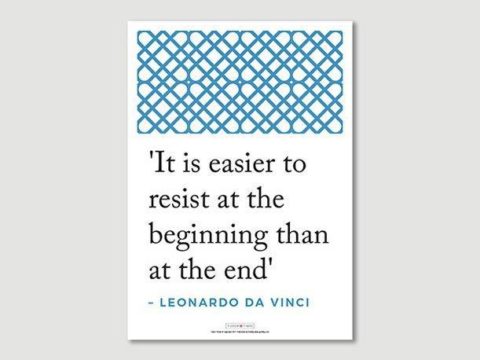Thomas More: Life Story
Chapter 14 : Lord Chancellor
At some point during 1525 or 1526, Henry VIII began to question the validity of his marriage. His reasons were complex, related to his fading feelings for a wife he had once loved, a new and passionate desire for a younger woman, and, probably most importantly, his political position. For Henry, a male heir was an absolute necessity, both politically and personally and his lack of a legitimate son led him to question whether his marriage was valid. His loss of interest in Katharine, and his desire for Anne perhaps helped him to the conclusion that he wanted – his marriage was not legal, and should be annulled.
We do not know when More became aware of the King’s thoughts. He was closely associated with Henry and Wolsey and it is unlikely that he would not have been consulted. He was first officially notified by Henry in late September of 1527. This was after a secret court had been convened in May to try the case, so it seems unlikely that it was actually the first More had heard of it. It was, however, the first time the King had directly asked More’s opinion.
According to More’s account, Henry broached the matter at Hampton Court, showing More the verses in Leviticus on which he was resting his case. More does not record what his answer to Henry was, only that Henry asked him to go away and think about it – the implication being that More had offered less than full-throated support.
More however, did not offer any open challenge, merely refusing to involve himself on either side since the matter was being attended to by the spiritual authorities – personified by Wolsey and Cardinal Campeggio. Whilst, in a gesture that suggests he hoped to be persuaded that Henry was right, he would read works supporting Henry’s view, but not Katharine’s position, and did his best to stay out of the matter.
At the end of June 1529, More travelled to France with Tunstall to affirm England’s entry to the Peace of Cambrai, which, for the time being at least, put a stop to the war between François I and Charles V. On his return, More discovered that the mighty Cardinal, once so close to Henry that the Venetians described him as ‘alter Rex’ (the other King) had fallen from favour and was shortly to be dismissed from his office as Lord Chancellor.
More was invited to take his place. On 25th October he went in solemn procession with the other councillors and great men of the kingdom to Westminster Hall and the Chancery. He was sworn in, and presented with the Great Seal of England, as well as the ceremonial sceptre and book that were to be carried before him on official occasions.
It appears to have been a popular choice. More was a diligent councillor, not considered to be unduly ambitious or avaricious. He had a reputation for giving swift justice in his former roles as Chancellor of the Duchy of Lancaster and Under-Sheriff of London, he was still on good terms with the City grandees, and both Henry and the English ecclesiastical authorities had relied on him to counter Luther.
His only shortcoming, in Henry’s eyes, was a refusal to confirm that he agreed Henry and Katharine’s marriage to be invalid, although he did not make any public declaration in the other direction, either. Ackroyd suggests that More’s known or suspected support for Katharine was actually a factor in Henry’s decision – it would have shown him to be acting in genuine good faith in his quest for an annulment, rather than for personal reasons.
In November 1529, More addressed a new Parliament as Lord Chancellor. This assembly, which later came to be known as the ‘Reformation Parliament’, was distinctly anti-clerical in tone. With the fall of the great Cardinal, years of resentment against over-mighty and over-greedy priests was unleashed. Demands were made to curb ecclesiastical abuses, and Wolsey himself was charged with heinous crimes of treason and endangering Henry’s health.
More, the Duke of Norfolk (Anne Boleyn’s uncle) and the Duke of Suffolk (Henry’s brother-in-law) were now the King’s chief advisors, but More’s distance from the King in the ‘Secret Matter’ gave him more time than his predecessor had had for attending to the core legal duties of the Lord Chancellor.
As a man trained in the law, unlike Wolsey, he was far more rigorous about ensuring that his judgements accorded with law and precedent, although he did fulfil the duty of the Lord Chancellor to mitigate the common law with equity where the occasion required. He heard almost double the number of cases that Wolsey had heard, suggesting that many petitioners preferred to seek justice in the Courts of Chancery under More, than in the Common Law Courts.
He strove to be completely impartial in his judgements, even ruling against Giles Heron, husband of his daughter, Cicely in a case. One anecdote quoted by Ackroyd gives an insight into More’s practical sense, even when it affected himself. His wife had found a stray dog. The dog’s owner, a poor woman, had come to More and demanded its return. More ordered the dog to be put between the two women, who were both to call it. When the dog rushed to its old owner, More confirmed that it was indeed her dog.
In religious matters, however, he was implacable. New proclamations were published against heretical books, and a vernacular Bible, which More had previously advocated, was judged as unsuitable for such difficult times. More worked closely with Bishop Stokesley who had succeeded to the Bishopric of London when Tunstall was translated to Durham, and around ten heretics (we cannot find a definite figure) were burnt during his Chancellorship, compared with none under Wolsey.



